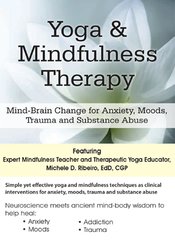
Yoga and mindfulness are based in the idea that you can cultivate a healthy, happy life by intention, using mind-body meditative methods.
Recent neuroscience research indicates that these evidence-based practices change the brain in ways that help overcome anxiety, depression, trauma, and substance abuse. Learn an integrative approach to mind, body, spirit healing using the natural, built-in capacity to think, sense, move, and feel in the present moment.
Practice interventions with Michele D. Ribeiro, EdD, CGP, experienced yoga and mindfulness teacher, clinician and researcher. Learn how to help your clients regulate their emotions, clarify their thinking, and lessen physical discomforts. Deepen the therapeutic relationship as you awaken your healing presence and empower yourself and your clients to make better choices.
You will come away from this recording with a clear understanding of the neuroscience behind these practices, a profound experience for yourself, and new techniques and protocols for your therapy sessions to improve client outcomes.
| File type | File name | Number of pages | |
|---|---|---|---|
| Manual - Yoga & Mindfulness Therapy (4.6 MB) | 87 Pages | Available after Purchase |
Michele D. Ribeiro, EdD, CGP, is a Licensed Psychologist, Certified Group Psychotherapist, Certified Yoga Instructor and a Children/Teens Meditation Course Teacher. She has been applying mindful awareness as a therapist and teaching mindfulness as a skill to clients presenting with depression, anxiety, ADHD, trauma, eating disorders and addiction issues for over 20 years.
Dr. Ribeiro began her yoga studies in 1997 and completed advanced yoga training in India at numerous yoga centers and ashrams including the Indian Yoga Institute, Prashanti Kuteeram in Bangalore, the Yoga Study Center in Rishikesh, the Ramamani Iyengar Memorial Yoga Institute in Pune, India and at the Iyengar Yoga Center of New York in NYC. She has written on mindfulness for the Group Psychologist Newsletter and assisted with editing journal articles on yoga and ALS in the Journal of Alternative and Complementary Medicine.
Dr. Ribeiro has a private consulting practice, works as a psychologist and instructor at Oregon State University and is co-owner of the Iyengar Yoga Center of the Willamette Valley in Corvallis, OR. She has taught yoga, mindfulness practices, and biofeedback at various universities, schools, and conferences throughout the United States and abroad while working as a psychologist for Semester at Sea.
She serves on the planning committee to create a new Yoga Certification Program, is on the steering committee for expanding Contemplative Studies and is co-leading the development of a new Mindful Living and Learning Community all at Oregon State University.
Speaker Disclosures:
Financial: Michele Ribeiro is in private practice. She receives a speaking honorarium from PESI, Inc. She has no relevant financial relationships with ineligible organizations.
Non-financial: Michele Ribeiro is a member of the American Group Psychotherapy Association.
Mindfulness and Yoga as an Evidence-Based Clinical Intervention:
A Holistic, Mind/Body Approach
Please wait ...